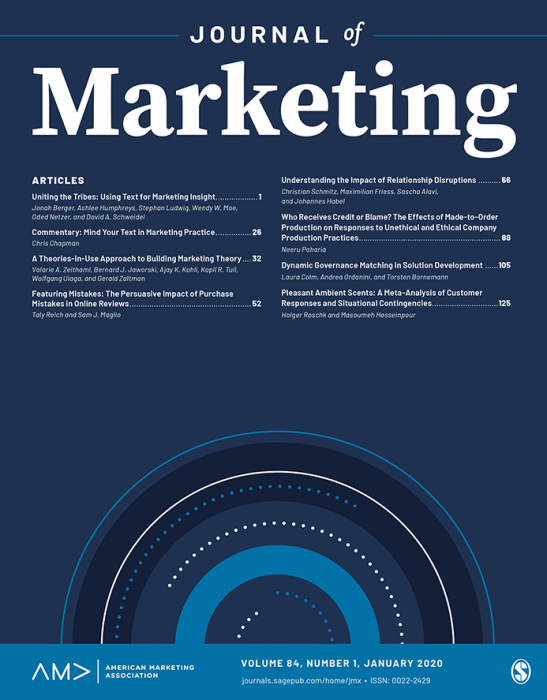EXPRESS: Natural Affect DEtection (NADE): Using Emojis to Infer Emotions from Text
IF 11.5
1区 管理学
Q1 BUSINESS
引用次数: 0
Abstract
Emotions are central to consumer communications, and extracting them from user-generated online content is crucial for marketers, considering that such consumer opinions significantly shape brand perceptions, influence purchase decisions, and provide essential insights for marketing analytics. To leverage vast user-generated data, marketers and researchers require advanced text-to-emotion converters. However, existing tools for fine-grained emotion extraction face several limitations: Lexica are constrained by their dictionaries, machine learning models by human-annotated training data, and large language models by insufficient validation. As a result, marketing research still tends to rely on mere sentiment detection instead of extracting more nuanced emotions from text. This paper introduces Nade (Natural Affect DEtection), a novel text-to-emoji-to-emotion converter that first “emojifies” language and then converts these emojis into intensity measures of well-established, theory-grounded emotions. This approach addresses the limitations of existing tools by leveraging the inherent emotional information in emojis. Using human raters and state-of-the-art converters as benchmarks, the authors establish the benefits of exploiting emojis, validate Nade, and demonstrate its use in several marketing applications using data from various social media platforms. Users can apply the proposed converter through an easy-to-use online app and programming packages for Python and R.快讯:自然情感保护(NADE):使用表情符号从文本中推断情绪
情感是消费者沟通的核心,从用户生成的在线内容中提取情感对营销人员来说至关重要,因为这种消费者意见会显著影响品牌认知,影响购买决策,并为营销分析提供必要的见解。为了利用大量用户生成的数据,营销人员和研究人员需要先进的文本到情感转换器。然而,现有的细粒度情感提取工具面临着一些限制:Lexica受其词典的限制,机器学习模型受人类注释的训练数据的限制,大型语言模型受验证不足的限制。因此,营销研究仍然倾向于仅仅依靠情感检测,而不是从文本中提取更细微的情感。本文介绍了Nade(自然情感检测),这是一种新颖的文本到表情符号到情感的转换器,它首先将语言“表情”化,然后将这些表情符号转换为已建立的、基于理论的情感的强度测量。这种方法通过利用表情符号中固有的情感信息来解决现有工具的局限性。以人类评分者和最先进的转换器为基准,作者建立了利用表情符号的好处,验证了Nade,并使用来自各种社交媒体平台的数据演示了它在几个营销应用程序中的使用。用户可以通过一个易于使用的在线应用程序和Python和R编程包来应用拟议的转换器。
本文章由计算机程序翻译,如有差异,请以英文原文为准。
求助全文
约1分钟内获得全文
求助全文
来源期刊

Journal of Marketing
BUSINESS-
CiteScore
24.10
自引率
5.40%
发文量
49
期刊介绍:
Founded in 1936,the Journal of Marketing (JM) serves as a premier outlet for substantive research in marketing. JM is dedicated to developing and disseminating knowledge about real-world marketing questions, catering to scholars, educators, managers, policy makers, consumers, and other global societal stakeholders. Over the years,JM has played a crucial role in shaping the content and boundaries of the marketing discipline.
 求助内容:
求助内容: 应助结果提醒方式:
应助结果提醒方式:


